- Home
- J. P. Donleavy
Meet My Maker the Mad Molecule Page 2
Meet My Maker the Mad Molecule Read online
Page 2
They kissed in the garage, hard by the summer screens stacked for storage, and she said, “I’ve been happy, Al, happy.” Following in the wake of this sentiment to the third landing where she pecked him goodnight on the cheek and said, “Thank you for today.” Alphonse saying to himself, don’t press the advantage, just keep it warm so it doesn’t cool. In his bedroom, lying, listening, and waiting on the pine perfumed sheets.
A quick reconnoiter outside his door for any moving member of the household. Avoid squeaking stairs number four and six. Move on the right floor board of the landing which is securely nailed to the carrying rafter. And beware stairs number two, six and seven. As one counts going up in the dark. And she, perhaps, he hoped, lay lightly in the twilight of a glittering dream of Alphonse, high up, familiar with people you want to know, Rebecca, forever, and say, gee they’re my closest friends to whom I could go if I didn’t have my subway fare. And today, the game and the way they welcomed Alphonse and how his old coach said so sincerely, “We could use you in there, today, Al, we really could.”
Alphonse A had a conscience, saying a variety of things. You’re real rotten. A little reflected stardom as a hasbeen and you ride roughshod over ethics, devoid of one vestige of moral momentum. Alphonse, a guiding hand pausing on the bannister, taking up his defense. Hush now. This world is a jungle. My moral momentum may be minimum but it is more than most. And one floor board here is a lulu. I’m coming to borrow her toothbrush or something, with maybe a minute to chat about the bristles. Must knock. No excuse for a lack of manners. If I barge in unannounced she might go tearing through the ceiling and roll down the roof outside, loosening all the slates. The risks I take are desperate. If I could behave with this abandon in the business world, The Chase Manhattan Bank would send me greetings on my birthday. With maybe three clerks to sing,
O Alphonse
A
Have a happy
Birthday.
Rebecca distant in the dark. Copper hair all black on her pillow. Alphonse A, time 3 A.M., attired in dressing gown, approaching from the flank. Deploying and moving forward under cover of knowing every inch of this soft carpet. She sits suddenly bolt upright. Alphonse listening to the deep intake of breath signifying panic and a large piercing scream about to come. But parting his lips and lighting the way ahead with the beacon of his smile. A friendly ship draws near, dear. To an unfriendly voice.
“Who’s that.”
“Me.”
“What are you doing here.”
“Just me. Nothing.”
“You are.”
“Not so loud. Would you like an extra pillow.”
“I’ve got two.”
“Maybe another one.”
“Go.”
“Please. Let me stay.”
“Go.”
“Gee just five minutes.”
“No go.”
“No.”
“I’ll scream.”
“Honey what would my family think of me if you started screaming.”
“They’d think you were a sneaking rat.”
“Honey.”
“Go.”
“Just let me slip under the sheets with you for a second. Promise. Just one second. I’m shivering.”
“Go.”
“But I mean we’ve been going together for weeks. Don’t you have any mercy. A little connubial hors d’oeuvre.”
“Not until you marry me.”
“Honey you’ll have the nuptials, any time now.”
“Ha. Ha. Ha.”
“Rebecca, can’t you see I’m desperate. Five minutes solace. I’m lonely and forlorn. Can’t you understand. Let me in. The bed.”
“Not before nuptials.”
The struggle began routinely enough. An arm lock using the Jap reversible grip on the wrist. The knee cover to stop the leg flail. And some tiny soothing words whispered lightly from time to time, there, there, easy. As one of her hands escapes from the Jap lock to send the bedside lamp crashing to the floor. It is always hard to believe in these moments that they mean it, so many times they say months later, I wanted you to, if only you had gone on fighting. Tonight Alphonse was fighting. And bedclothes are on the floor along with the lamp. Not even time in this frantic festivity to hear if Mirabelle is still snoring across the hall.
“Let me go, you brute.”
“Rebecca, please be civilised.”
The light was a pale pale yellow and it flooded gently in from the hall. Crossing the crumpled white coverlet with a frail shadow. The frosted broken shell of glass. A breeze banging the white wooden anchor of the Venetian blind. High up a plane comes over Cambridge to cross the Charles River and fly in low over Boston Harbor to land. A cardboard cylinder of salt, a picture of a little girl with a yellow umbrella walking in the rain on blue. Tender moments when you were doing nothing at all, at all, some tiny piece of childhood faintly tells as it comes back to mind, that some things will never happen again. Until they happen.
Alphonse’s father spoke with a sad sincerity. A thin bony man in the doorway. Patrician perhaps, two long white hands holding the cord of his robe. Pillar of the neighborhood. His lips moving a few times, collecting a low thread-bare silence around his words.
“I will give you ten minutes to get out of this house forever.”
Dawn in the street as Alphonse tucked his possessions in the car. Huffing over a wicker hamper of books. One can rupture in the most fraught of times. A portable radio bought in an Army PX, a quiet little plan for a supply of music after the war. The box of sweat socks, bow ties and random haberdashery. Some big shouldered jackets for off field wear to look like a football star. One class picture to memorise each face in order to get out of the way when it’s seen coming along Madison Avenue. And with this unromantic antique aggregate of property, Alphonse A set off down Beacon Street on a straight line southerly out of Boston town.
New York that winter, terrible biting winds down grey canyons. And one dismal day he moved from Brooklyn across the river to Manhattan Island. Making wet tracks in a slush which lay on the flat friendless wasteland he left behind. Harry his beer boss said, “Al, wouldn’t you be happier maybe, let me fix you up with a territory in the Eastern Bronx.” And with a little map tacked to the green wall of his new apartment, Alphonse planned out a campaign using military references he remembered from his first seventy two hours in the Army and had never had cause to use again. At night he cooked in his kitchenette on an electric grill which frequently threw him against the wall with shocks.
Rebecca became a faint figure, her own little seat now, he guessed, on the Sixty Ninth Street ferry back and forth to Brooklyn. Hoping still for some nibble before nuptial he’d taken her for drinks to a group of friends, who sat sporty in big deep chairs and never once spoke to her the whole evening. As joss sticks smoked and canapes sailed into mouths. They asked him, “Hey, Al, we hear the old man kicked you out on your rear, no free loading in bean town no more.” And with head thrown back Alphonse laughed until putting his hand over his lips when Rebecca rushed from the room.
The ride that night out to Staten Island, Rebecca carped. He took breathers round the outside deck of the ferry. She said, “The cheap common company you keep.” And the journey back across the Narrows, little waves as the currents of black water met off Fort Jay. A barge was alight in the thick mist and Alphonse went forward to stand bow front staring ahead at the dim beads of windows strung up and down in the distance. He had a solitary hot dog and coffee and quietly listened as a seated odd ball citizen mumbled, “We need more funeral parlors in Richmond County.”
Nights Alphonse slept as sound as a bell, ringing only when it was time to rise. To go forth across the luminous land of the East Bronx. First standing at the ice box door, draped in an undergarment defying description, legs crossed in a pose of thought, eating a slice of pineapple and pecan coffee cake. And Harry, his unurgent sad eyed superior, who quietly felt Alphonse was a great guy if he would only get out there and canvass. And
was pleased when one day Alphonse came into his glass cage in the corner of their office floor and said, “Mr. G, let it not be gainsaid that I want to sell more beer in the Bronx.”
Alphonse in the resolute weeks that followed, made his lonely pioneering way along Two Hundred and Thirty Third Street and further east. Breaking all sales records through Hunt’s Point, Clason’s Point and Throgg’s Neck. Only once, in a side road parked under a tree near a vacant lot with kids playing in the clouds of dust, did Alphonse crack like a soft boiled egg. Letting the tears come down as he looked at his knees shining under the crease he’d made with his own iron that morning. His head slumped on his chest, wiping the salt water away with the back of his hand. A police patrol car went by and they looked.
But in this new demeanour, Alphonse spread good will, shooting out a hand leading with his right shoulder, he grinned and squeezed his economic way upward. Always a glad word for the man who was slowing in endeavor, whose goose might be slowly cooking. He asked after people’s families. After their cats and dogs with nary a qualm for the Dalmatians that might be among them. He led groups from one soirée to another, saying, “Let’s go, gang, it’s hard but it’s fair, but gang, let’s go.” At traffic lights as they turned to green, he said again back into his crowded car,
“Go. Go.” And old friends said, “This is the Alphonse A we used to know.”
Ashamed of his recent dwellings, Alphonse moved again. To the East Sixties, and lived behind three bow fronted windows three stories up. Entering from the street on black and white tile steps, between boxwood shrubs and through heavy filigree steel on frosted glass. An Eastern Embassy across the street, a black suited member of whose staff waited discreetly each morning while a leashed black poodle lifted a leg on a newly planted tree. In these new digs which he tried to keep secret, Alphonse spent Wednesday evenings polishing Victorian weighing instruments of which he had collected three.
Until this one Wednesday when early afternoon he’d returned from the reaches of West-chester Heights along the Boston Post Road slightly feeling in the dumps. By appointment he’d paid a solitary visit to the Bronx Annex of the American Indian, wishing they had never given up to the newcomers. And as the day ended Alphonse took bun and Coca Cola at a table on the terrace of Central Park Zoo. Kids’ blue, red and yellow balloons caught up in the trees. Those slow of wit went lurking and matching theirs at the other animals behind the bars. The sun blinding red in the windows high up over Fifth Avenue. Bees hummed distinctly in the ivy and cheerless growls came from the big cats. All drowned by the screams of a little kid whacked by his father across the arse.
And Alphonse A slowly walked back to his address, looking up between grey stone fronted buildings at the sky. His decision to make money just in case it brought happiness. And to avoid marriage in case it brought chains. And turning into his entrance he rose standing over the orange and blue mosaic of an eagle on the elevator floor. A pale yellow envelope lay next to his evening newspaper on the marble table outside his door. Alphonse said to himself, someone’s dying or someone’s dead.
FATHER SERIOUSLY ILL COME IMMEDIATELY
That night he took the last train to Boston. A lonely figure crossing the deserted pink floor of Grand Central, the Zodiac spread on the ceiling in blue, gold and studded with electric stars. With a magazine opened vacantly on his lap, the train moved out between the dark pillars dripping rain from the street above. Coming up between the red brick tenements when you look down on the dark pavements and see things you saw before. A funeral chapel, freshly baked pizza 10¢ a slice, superior shoe hospital and suddenly, lit by a flash of lightning, large black letters on a high grey wall.
OSCAR THE GREAT
A bright moon in the cool night over Boston. Alphonse A lugging his catch all made from an Irish horse to a taxi in front of South Station. Taking his vehicle through all the tight familiar turnings of nearly a year ago. House with dim lights lit and a glow from behind the relic shades of his father’s front bedroom. And from the roadway looking up across this summer darkness, a feeling of Christmas. Holly, mistletoe, when you cry and cry as a little boy knowing what Ma and Pa are giving for a present, because sneak and betrayer, you spied under the day bed in the sewing room.
Alphonse with a looselimbed gait up the steps. The door opening before he could knock. His small mother holding her big son tightly. The hall stand chockablock with canes and one shillelagh. A ne’er do well uncle standing near the open door of his father’s library. His dark haired sister, college graduated, coming down the stairs already dressed in black and tears streaming down her face. Hello to Radcliffe girls everywhere. And Mirabelle making the biggest racket of all, appearing everywhere with moans, an empty tray and face. While his brother sat over a book in the kitchen studying for an exam.
Tonight he thought the trip was a false alarm, just one of those crazy or not so crazy things families do to get back together again. And his mother said, “Would you like to go up.” And the thing you think you will never do but do. Up the steps, stairs number three, eight and nine and the board on the landing outside his father’s door which ought to have squealed loudly one night in the past.
The doctor comes out of the room. One of his father’s oldest friends, whose eyes were full of secrets and who Autumns ago basted venison in the basement kitchen after a hunting trip and with his father in their cups might, just for the devil, sing as a barbershop quartet.
“Hi Doc.”
“Hi Alphonse, he’s asleep, only stay a minute, I don’t know how long he’s got.”
The door ajar. All yellow light. A bedside lamp is glowing. A tray of whiteness and white things. Like a little baby between the sheets. Who needs a mother. And kicked his big athletic son out of the house with thirteen final words and now lies without the strength of signature left.
In these quiet seconds as Alphonse stood over the bed, he knew his father was at that moment dying, quietly choking on his own breath. As he stepped closer, he felt just below his eyes across the soft part of his jaw his muscles making him smile and grin. And the beer salesman in him trying to stop it. And he couldn’t, standing on the soft carpet, grinning from ear to ear.
His father’s funeral was for the last time down the tree shaded street with its new leaves. Across two highways and train tracks. Great black iron gates. Gloved attendants in their quiet grey uniforms. All the trees and white sepulchres on the side of the hill. A magnolia fluffing its gentle flowers out, all pink against the stiff silver birch and tall elms older than all the graves.
The Mad Molecule
I woke on that terrible day and mixed the shredded apple in my raw porridge oats and poured on the cream. I know what’s good for me. I put on the shoes with the golfer’s soles, walked silently down the stairs and out into a great blue sky and along the river’s warm sweet smell.
Two days ago I looked down through my sparkling microscope. Opened up the diaphragm for more light and there it was. I said my my, what’s this, it moves. Bumping pinpoint bouncing merrily, wow, did a standing broad jump of ten microns just then. This is most extraordinary.
I didn’t think I’d tell the others but I had to. Great believer in the professional courtesy. Crowding round they said it was some crystalline salt. How could they be so cruel. I told them go away. I gave it the test for proteins. It passed.
At lunch I went with my little bag of garlic bread, which for various reasons I must eat alone, to the little churchyard that juts out a soft green silence in the river. I watched the gasworks making gas hiding all the heaven and the tiny derricks scooping coal. I let my sad grey face smile at the excursion boats waving by. And sunk my teeth into the crackling crust while the little toy train went tootling over the bridge. And as I looked up river to more smoke mountains wearing lightning conductors like a crown, I said hello in my heart to neglected people everywhere.
I went back through the streets of tired houses tight between the raging factories. All their windows trimmed in green with c
urtains gold and closed. To discover something is such great joy. A new molecule, a whole new series which I may call the mad proteins. And buy one of these little houses, rest a retired heart in there, slippered feet up and lungs wheezing while night goes by. And perhaps in an attic recess with slides and books quietly dipping my oil immersion lens. I don’t want much.
And there on my table the little white memo near my curling vines. Mr. So and so wants to see Mr. D. I looked around at my professional colleagues. All their faces turned away, huddled with guilt. As soon as my back is turned. This is what I get for courtesy.
Along this wide corridor and up the fireproof stairs. See a tug out there. If only I could be a captain of one of those little ships, just ply my way back and forth, smiling from shore to shore. Where there’s no one to betray me over a molecule.
Knocking on this glass door. Come in. Mr. D, do please sit down. I prefer to stand. Very well, Mr. D, but what I have got to say may be difficult, if you follow me. I am following. Now, Mr. D, have you been feeling all right recently. I’m feeling very well. No headaches? Sir, do make yourself clear. Mr. D, as you know, you’ve been with us for nearly a year and we understand you’ve done some interesting if rather obscure work, however, we feel you need a rest, somewhere quiet perhaps, the ships’ whistles are nerve racking at times. Sir, I love them. That may be, Mr. D, however, it is the considered opinion of this department that you need a rest. I’m not tired. I understand that, Mr. D, but even so it is our policy to give people a great deal of latitude and even longitude when feasible, but we feel you need a rest and in your own interests to go the south of somewhere for a month, naturally at our expense. Although I like you, Mr. D, we don’t feel you ought to return here. I am sorry, Mr. D.
I was sorry, too. Mr. So and so offered his hand. Success had given him a warm friendly smile. So sadly I collected my little vines I let grow on my bench and looked my last look from my window. I walked away with the rich gleaming joy of my mad molecule.

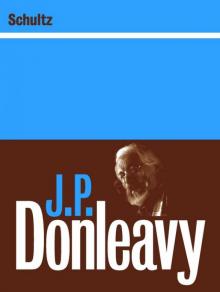 Schultz
Schultz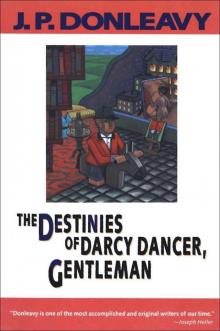 The Destinies of Darcy Dancer, Gentleman
The Destinies of Darcy Dancer, Gentleman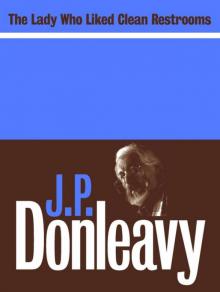 The Lady Who Liked Clean Restrooms
The Lady Who Liked Clean Restrooms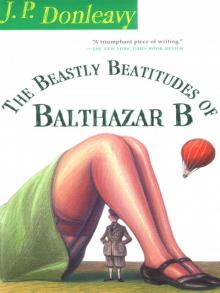 The Beastly Beatitudes of Balthazar B
The Beastly Beatitudes of Balthazar B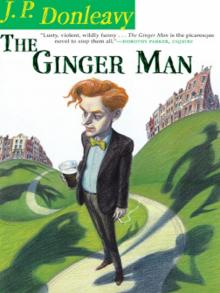 The Ginger Man
The Ginger Man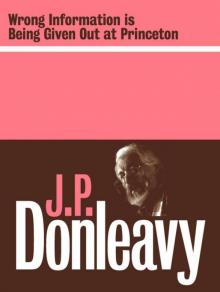 Wrong Information Is Being Given Out at Princeton
Wrong Information Is Being Given Out at Princeton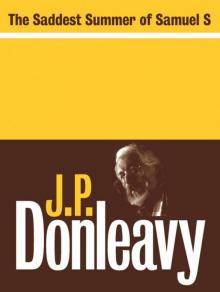 The Saddest Summer of Samuel S
The Saddest Summer of Samuel S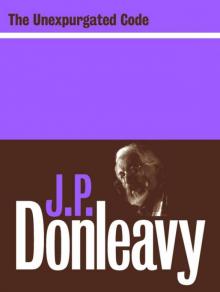 The Unexpurgated Code
The Unexpurgated Code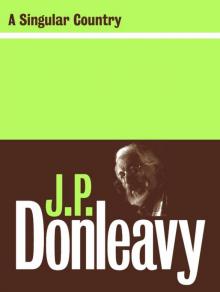 A Singular Country
A Singular Country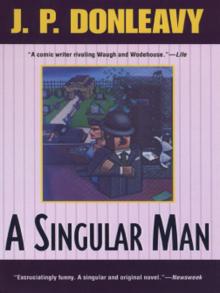 A Singular Man
A Singular Man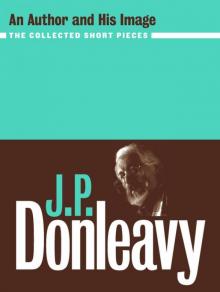 J.P. Donleavy: An Author and His Image
J.P. Donleavy: An Author and His Image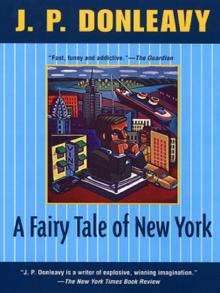 A Fairy Tale of New York
A Fairy Tale of New York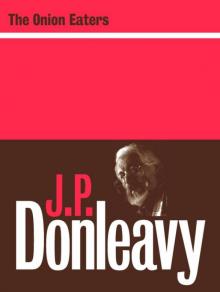 The Onion Eaters
The Onion Eaters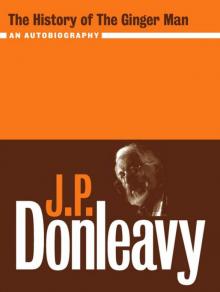 The History of the Ginger Man: An Autobiography
The History of the Ginger Man: An Autobiography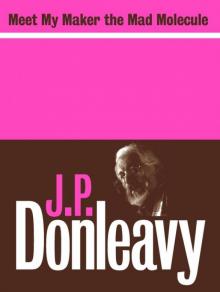 Meet My Maker the Mad Molecule
Meet My Maker the Mad Molecule Leila
Leila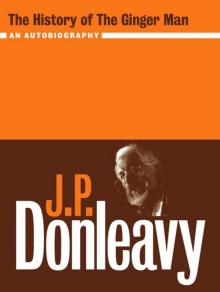 The History of the Ginger Man
The History of the Ginger Man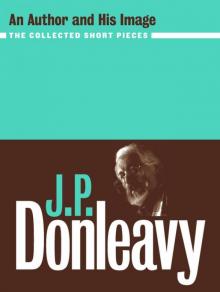 J.P. Donleavy
J.P. Donleavy